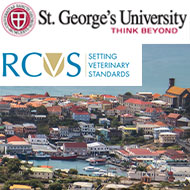Caribbean veterinary school gains RCVS accreditation

"To be fully accredited by the RCVS puts us right at the top in terms of the quality of training that we provide to our students looking to pursue a career in animal health care".
St George’s University (SGU) Doctor of Veterinary Medicine (DVM) Programme has received full accreditation from the RCVS.
The accreditation means that SGU DVM students, who have also completed the Global Veterinary Health Track, will now be eligible to register as members of the RCVS and practise in the UK without further examination.
Dr Neil Olson, dean of SGU’s School of Veterinary Medicine (SVM), said: “The RCVS accreditation reaffirms SGU’s commitment to offering the highest-quality education and services to aspiring veterinary students. Our dual accreditation is a major feather in our cap for the future recruitment of the best and brightest students and faculty to our program from around the world.”
The SGU’s School of Veterinary Medicine is one of only a handful in the world to be accredited by both the American Veterinary Medical Association (AVMA) in the United States and Canada, as well as the RCVS in the UK.
The decision was taken following two visits by RCVS to the SGU Campus in Grenada, which took place in 2017 and 2019. The visits determined that the SVM was well managed, run sustainably, properly resourced, and provided an up-to-date professional curriculum and appropriate student support, under RCVS standards.
Now in its 20th year, the School has seen the graduation of some 1,700 students who have gone on to practice in 49 states in the United States and 16 countries around the world. It maintains partnerships with 31 universities and clinical facilities in the US, UK, Canada, Ireland and Australia.
Dr Olson continued: “To be fully accredited by the RCVS puts us right at the top in terms of the quality of training that we provide to our students looking to pursue a career in animal health care. As we continue to expand and grow our successful veterinary program at SGU, we will look for further partnerships around the world.”



 The Veterinary Medicines Directorate (VMD) is inviting applications from veterinary students to attend a one-week extramural studies (EMS) placement in July 2026.
The Veterinary Medicines Directorate (VMD) is inviting applications from veterinary students to attend a one-week extramural studies (EMS) placement in July 2026.